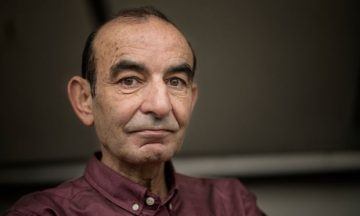Alex Preston in The Guardian:
 Ramallah, in the heart of the West Bank, is only a few miles north of Jerusalem, its nose pressed up against the dashes of Palestine’s borders on the maps, official markers of the city’s – and the country’s – provisional nature. It is a place of scarcely 30,000 inhabitants, historically a Christian city (although now the majority are Muslim) and also one of cold winters and carefully tended gardens, chosen by the PLO as its de facto headquarters following the Oslo accords of 1993 and 1995. It is, above all, a city of authors, home to Palestine’s greatest poet, the late Mahmoud Darwish, and the man we can now recognise as its greatest prose writer, Raja Shehadeh.
Ramallah, in the heart of the West Bank, is only a few miles north of Jerusalem, its nose pressed up against the dashes of Palestine’s borders on the maps, official markers of the city’s – and the country’s – provisional nature. It is a place of scarcely 30,000 inhabitants, historically a Christian city (although now the majority are Muslim) and also one of cold winters and carefully tended gardens, chosen by the PLO as its de facto headquarters following the Oslo accords of 1993 and 1995. It is, above all, a city of authors, home to Palestine’s greatest poet, the late Mahmoud Darwish, and the man we can now recognise as its greatest prose writer, Raja Shehadeh.
Shehadeh won the Orwell prize for his 2007 book Palestinian Walks and published a powerful memoir of a cross-border friendship, Where the Line Is Drawn, in 2017. These books built on earlier memoirs, Strangers in the Houseand When the Bulbul Stopped Singing, written at the beginning of the century, during the second intifada, when any optimism that the Oslo agreements might bring peace had died, and a new kind of hope gripped Palestine – that desperate and violent resistance might succeed where political negotiation had failed.
Palestinian Walks was the story of 27 years’ worth of walking in the hills of the West Bank, while Going Hometakes place on a single day, 5 June 2017, the 50th anniversary of the Israeli invasion of Palestine. Shehadeh sets out to walk to a meeting at his office – he’s a practicing lawyer as well as the founder of Al-Haq, the human rights campaign group – and strolls through the city in which he has spent most of his life. Normally, the walk to his office takes only 45 minutes, but he stretches it out to four hours, chewing over the history of his city. After the meeting, he walks home, reflecting on “how the city I grew up in has remained with me”. Going Home is a travelogue, a lament, a record of a vanishing city and its near-vanished inhabitants, most of whom (despite World Bank incentives) have fled to the US or Europe.
More here.
